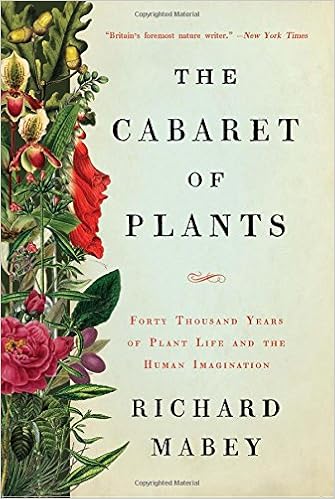 Richard Mabey, author of The Cabaret of Plants: Forty Thousand Years of Plant Life and the Human Imagination, was interviewed recently by National Geographic:
Richard Mabey, author of The Cabaret of Plants: Forty Thousand Years of Plant Life and the Human Imagination, was interviewed recently by National Geographic:
There Is Such a Thing as Plant Intelligence
…
We tend to judge plants not as autonomous organisms but in terms of what they can do for us. But they’re astonishing in their own right and deserve to be given the same ethical status as animals.
…
It’s long been known that the trees in a forest are connected by mycorrhizal fungi. This means fungi that live symbiotically with the roots of forest trees. The forest trees can’t grow without them because they haven’t got enough access to the minerals in the soil, and the fungi can’t grow without the trees because they have no chlorophyll and therefore can’t manufacture sugars. It’s a beautiful symbiosis in which all trees are involved.
What has now begun to be discovered is that the mycorrhizal fungi don’t surround just one tree. By using radioactive trace elements, the researchers were able to show that nutrients were being passed by the fungi between different species of trees over a large area. The trees that were not so good in the winter, like aspens, were being given food manufactured by the conifers, which do much better in winter, and vice versa. So the fungus is actually helping to distribute food amongst forest trees so that they all benefit at the right time.
Messages about predators are also being sent. …
Plants create their own ecology.
One of the discoveries being made is that Lamarck’s theory, which was discredited for a century, is now being shown to be true. Acquired characteristics can be inherited. The new science of epigenetics is finding that a number of changes produced in organisms during their own lifetime are passed on to their offspring. So far, it’s a limited number. But stresses due to climate, virus invasion or changes in soil can actually change the genome of the organism. More.
Yes, Lamarck is nearly finished cleaning off all the mud that Darwin’s followers have thrown at him over the years …
There is a lot of this “plants think” language around now. The author helpfully makes the point, lost on some, that we are here discussing intelligence as the use of information, not intelligence as a synonym for consciousness.
Note: “the same ethical status as animals”? That would certainly be a step up from the status of children in utero in the Western world today.
See also: New Scientist: Plants have “evolved” forgetfulness. Researcher: Plants also have “short-term memory”, which doesn’t depend on DNA and RNA. “This type of memory is not studied properly in plants.
Epigenetic change: Lamarck, wake up, you’re wanted in the conference room!
and
Does intelligence depend on a specific type of brain? (No)
Follow UD News at Twitter!